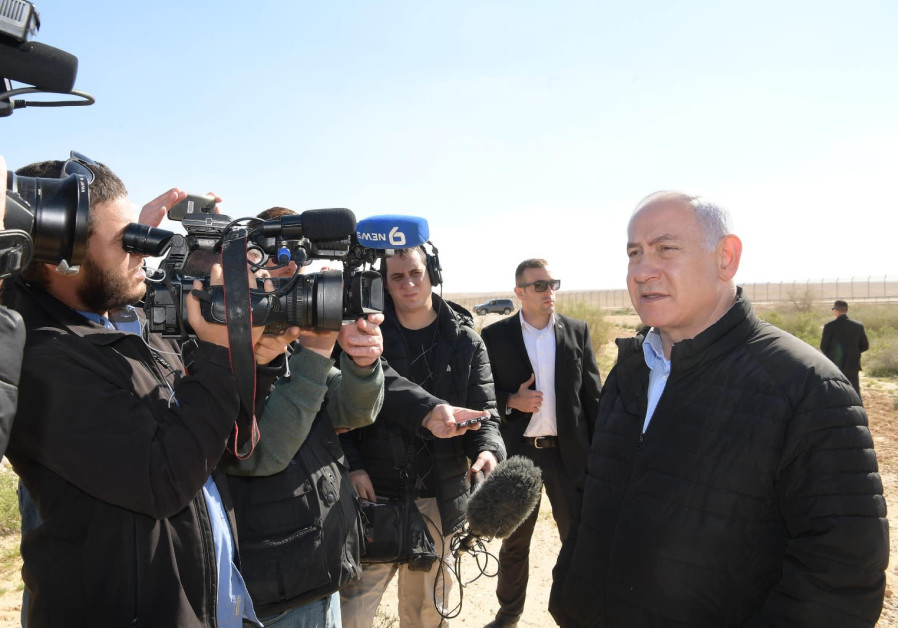Netanyahu: Israel will strike Gaza doubly hard for every Hamas attack

Prime Minister Benjamin Netanyahu on the Sinai border, March 7th, 2019. (photo credit: AMOS BEN-GERSHOM/GPO)
The IDF will respond with double the force for every Hamas attack against southern Israel, Prime Minister Benjamin Netanyahu said as he toured Israel’s border with Egypt by the Sinai desert.
He spoke in advance of the weekly Hamas led protests against Israel’s southern border with Gaza.
“Hamas should understand now that any display of aggression will be met with a very vigorous response on Israel’s part. They would do well to understand this now rather than later,” Netanyahu said.
In the moments that the stood in the sand dunes by the Sinai order, an IDF tank attacked a Hamas military post in the northern Gaza Strip in retaliation for a Palestinian shooting attack Thursday against military infrastructure by the Gaza border fence.
Netanyahu said that was heading from the Sinai border to a briefing on the situation at the Gaza border with the IDF chief-of-staff, the head of the Southern Command and the head of the IDF’s Gaza division.
“From here I am going to a briefing and security update with the Chief-of-Staff, GOC Southern Command and the commander of the IDF Gaza Division, to evaluate the situation that has been created and to provide a response. I am aware that in recent days there has been a renewal of Hamas aggression in all sorts of ways.
Egyptian security officials on Thursday returned to the Gaza Strip as part of Cairo’s effort to ease tensions between Israel and Hamas.
The officials, headed by Gen. Ahmed Abdel Khaleq, who is in charge of the “Palestinian portfolio” in Egypt’s General Intelligence Service, visited the Rafah border crossing between the Gaza Strip and Egypt. They were accompanied by Tawfiq Abu Na’im, head of the Hamas-controlled security forces in the Gaza Strip.
Sources in the Gaza Strip said that the Egyptian security officials entered the Gaza Strip through the Erez border crossing with Israel. According to the sources, the Egyptian officials held talks with Israeli government and security officials about the situation in the Gaza Strip.
On Wednesday, the Egyptian team met in the Gaza Strip with Hamas and Islamic Jihad leaders and discussed with them ways of averting violence along the border with Israel, the sources said.
The Hamas and Islamic Jihad leaders reportedly told the Egyptians that they were interested in restoring the previous understandings with Israel concerning a truce in the Gaza Strip. The leaders claimed that Israel has violated the understandings by refusing to allow Qatar to transfer additional funds to the Gaza Strip. Hamas and Islamic Jihad are also reported to have told the Egyptians that the demonstrations along the border with Israel, which are being held in the context of the so-called March of Return, will continue until the blockade on the coastal enclave is removed.
Israeli-Gaza violence has escalated throughout the week. On Thursday morning, the Hamas run Gaza Health Ministry said that Saif al-Din Abu Zaid, 15, had died from a head wound from IDF gunfire. He was shot while participating in a riot on the northern Gaza border in which rioters attempted to throw explosive devices at troops stationed along the border.
At that same time, an incoming rocket siren was activated in communities in the Sha’ar Hanegev Regional Council area bordering the Gaza Strip. There were no injuries or damage.
Around an hour later, additional incoming rocket sirens were activated after a mortar was fired toward communities in Israel’s Eshkol Regional Council area.
In response, Israeli warplanes carried out intensive airstrikes in the southern Gaza Strip, which according to Palestinian media destroyed a Hamas naval commando base and damaged several nearby homes. There were no injuries reported.
“Fighter jets and aircraft struck several military targets in a Hamas compound in the southern Gaza Strip,” the Israel Defense Forces said in a statement Thursday, adding that the IDF holds Hamas responsible for all cross-border attacks.
Thousands of Gazans have been protesting along the security fence on a weekly basis, taking part in the March of Return demonstrations which began on March 30, calling for a return to sovereign Israel and an end Israeli restrictions on the entry of goods and people into the Strip.
Over the past year of riots, the timing and frequency of the clashes has changed, with Hamas increasing their frequency with large-scale riots occurring during the week as well as at night. The nighttime riots have included different tactics, focusing more on psychological warfare against civilians in nearby communities with loud explosives and the use of megaphones to project death threats in Hebrew.
The devices have caused 2,000 separate fires, resulting in more than 35,000 dunams (approximately 8,500 acres) being burned. According to the IDF, this has included more than 13,000 dunams (approximately 3,200 acres) of nature reserves, and more than 11,000 dunams (approximately 2,700 acres) of forestry.
Several explosive devices attached to clusters of balloons have exploded in the air above communities in southern Israel, causing damage to homes and farmland.
The IDF military intelligence assessment for 2019 has warned that a continued deterioration of Gaza’s civilian infrastructure will likewise continue to put pressure on Hamas, which could lead to another violent clash with Israel, despite both sides not being interested in another war.
Join Jerusalem Post Premium Plus now for just $5 and upgrade your experience with an ads-free website and exclusive content. Click here>>






Comments are closed.